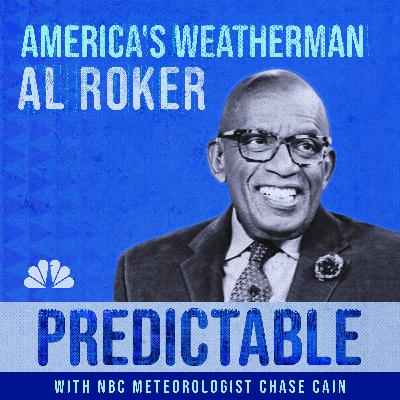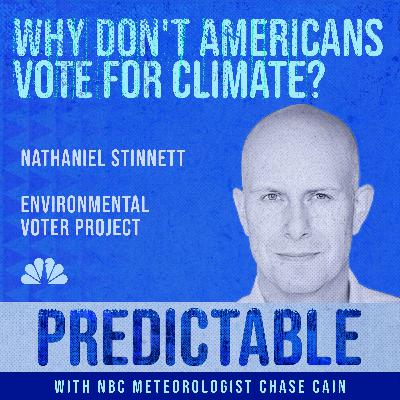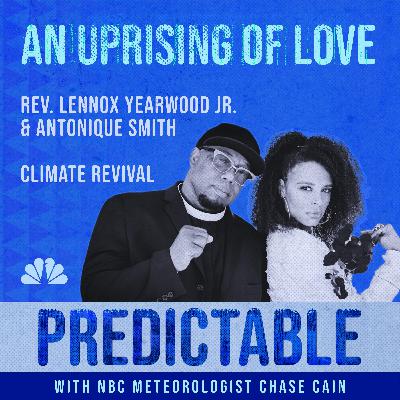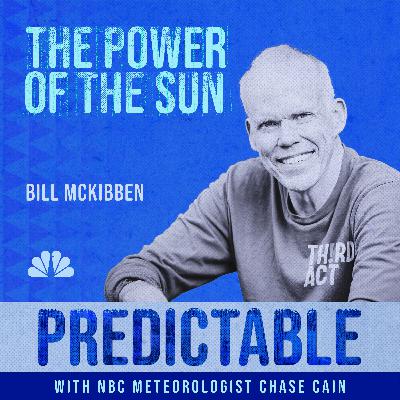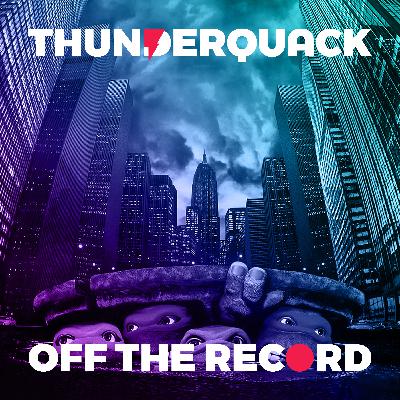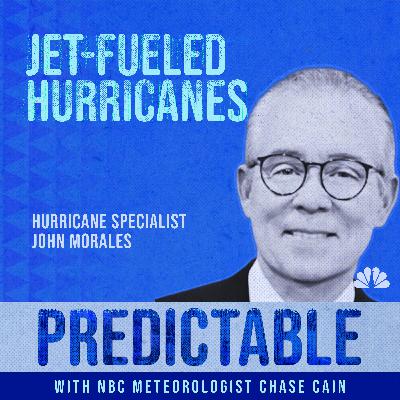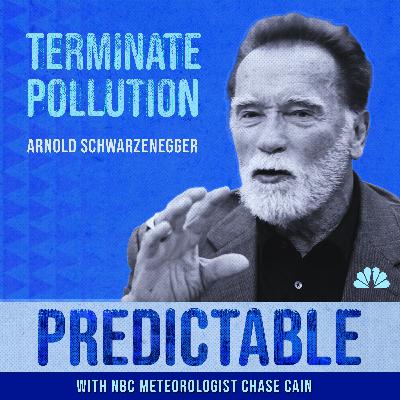Discover Predictable: NBC’s Weather and Climate Podcast
Predictable: NBC’s Weather and Climate Podcast

Predictable: NBC’s Weather and Climate Podcast
Author: NBC
Subscribed: 1Played: 0Subscribe
Share
© NBC
Description
Predictable will explore everything from how we forecast tomorrow’s weather — to how we can predict droughts or hurricanes months ahead — and how climate change is impacting those predictions. NBC meteorologist Chase Cain will talk with everyone from celebrities to politicians and meteorologists to dive deep into the science and its impacts, but those conversations will be anything but predictable. The good news is that there’s still time to change what’s next and protect our beautiful planet.
8 Episodes
Reverse
Across more than four decades at NBC, Al Roker has covered a wide range of extreme weather. He's also traveled to cover some unforgettable stories, but which was his favorite? The Today co-host sits down with NBC meteorologist Chase Cain to discuss some of the weather events and stories he'll never forget.Al has also covered nearly two dozen Summer and Winter Olympic Games for the Today Show, beginning with Atlanta in 1996, and he talked with Chase about how climate change is increasingly impacting sports. Al noted a recent study which found that, of the 21 host cities for the Winter Olympics, only Sapporo, Japan will be able to reliably host the Games because of climate change. That's prompting concern among winter athletes — especially with the 2026 Milan Cortina games quickly approaching.You can also watch this interview with Al Roker, and if you missed the first episode of Predictable with Arnold Schwarzenegger, you can watch that conversation here.Subscribe to future episodes of Predictable on Apple Podcasts, Spotify, and Amazon Music. Hosted by Simplecast, an AdsWizz company. See pcm.adswizz.com for information about our collection and use of personal data for advertising.
The Environmental Voter Project has contacted nearly 13 million voters over the last decade, and before the 2026 midterm elections, they plan to contact 5 million! Over the next 12 months, the nonpartisan group will target Americans who care deeply about addressing climate change but have never voted in a midterm election. EVP hopes to turn those people into consistent voters.Nathaniel Stinnett, EVP’s founder and executive director, says their work has never been more important, because the group discovered many Americans don’t consider climate change a “political” issue. The group conducted a national poll which found that nearly 1-in-5 Americans think about climate impacts every day, but none of them thought that voting could be a solution to addressing the crisis. Not a single person!Meteorologist Chase Cain talks with Nathaniel Stinnett about what 2025’s off-year elections could reveal about 2026. And they dig into the surprising findings of EVP’s national poll and how it could shape the future of climate action in the U.S.Read the full results of the national poll: https://www.environmentalvoter.org/sites/default/files/documents/july-2025-national-survey-on-social-context-of-climate-views.pdf If you missed the first episode of Predictable with Arnold Schwarzenegger, you can watch that conversation here.Subscribe to future episodes of Predictable for free on Apple Podcasts, Spotify, and Amazon Music. Hosted by Simplecast, an AdsWizz company. See pcm.adswizz.com for information about our collection and use of personal data for advertising.
What would happen if Americans of faith were on the front lines of advocating for the protection of our planet? That's the dream of Climate Revival, co-founded by Rev. Lennox Yearwood Jr. and Grammy-nominated Broadway star Antonique Smith. The two want to engage Black churches in climate action, because the Bible calls Christians to be stewards of God's creation. However, this conversation extends beyond the bounds of religion. NBC meteorologist Chase Cain talks with them about how their work has the potential to reshape communities of color across the United States. Many Black and brown communities struggle with extreme urban heat in the summer, more frequent flooding, and higher levels of air pollution — all because of the legacy of redlining in America. NBC has highlighted those effects from the San Francisco Bay Area to Chicago, Philadelphia, and Washington, DC. Climate Revival believes Black churches can be the key to repair those historical challenges.In the fall of 2024, Rev. Yearwood and Antonique launched a Climate Revival tour from New Orleans to Philadelphia. And they're continuing with another climate rally in Atlanta on October 12th. If you missed the first episode of Predictable with Arnold Schwarzenegger, you can watch that conversation here.Subscribe to future episodes of Predictable for free on Apple Podcasts, Spotify, and Amazon Music. Hosted by Simplecast, an AdsWizz company. See pcm.adswizz.com for information about our collection and use of personal data for advertising.
In only an hour and a half, enough solar energy reaches Earth to power the entire planet for a year! And the sun never sends us a bill for its endless energy. Solar panels have also become so cheap to produce, that it's made solar the cheapest source of energy by far. The U.S. Energy Information calculates that generating electricity from fossil fuels like coal and gas costs between 2 and 4 times more than solar power. That's a big part of the reason the International Energy Agency projects that solar will be the world's #1 source of energy by 2033. The latest research from Yale University shows two-thirds of Americans support transitioning to clean energy by 2050, and 77% of Americans want to use public land to generate wind and solar power. So why is the Trump administration pushing back against cheap, clean energy?Journalist, environmentalist, and author Bill McKibben joins NBC meteorologist Chase Cain for a deep-dive into the wide-ranging benefits of rapidly adopting solar power and deploying it in creative ways. McKibben also founded Third Act to engage seniors on climate action, and his latest effort is aimed at increasing nationwide support to advance solar power and lower the cost of energy for everyone. The inaugural Sun Day kicks-off September 21st, and there are events scheduled across the U.S. You can find your local event here: https://www.sunday.earth/eventsRegardless of when you're listening to this episode, you can learn more about Bill McKibben's environmental efforts and his latest book Here Comes the Sun. Hosted by Simplecast, an AdsWizz company. See pcm.adswizz.com for information about our collection and use of personal data for advertising.
Homeowners across the United States already face a difficult choice — try to sell their beloved home or face foreclosure. It's already becoming a reality from Florida and Louisiana to California. That financial pressure is being driven by the soaring cost of home insurance. Climate change is making disasters more common, and it's making hurricanes, wildfires, and floods more extreme. In turn, insurance companies are rushing to offset the cost of those disasters by increasing rates.According to a new report from Realtor.com, in the metro areas of Miami, Fort Lauderdale, New Orleans, and Fort Myers insurance accounts for more than 20% of the monthly cost to own a home. That's more than many homeowners can afford. By the end of 2025, First Street projects that nearly 7% of all foreclosures across the U.S. will be linked to unaffordable home insurance. First Street's Chief Economist Jeremy Porter explains more about that concerning trend. He's among an increasing number of insurance experts, researchers, and politicians who say these are red flags that economic disaster is on the horizon.Senator Sheldon Whitehouse (D-RI) has been one of the loudest and most consistent voices sounding the alarm and advocating for change. He led the Senate Budget Committee's research which culminated in an alarming report published in December 2024. It found soaring insurance costs or non-renewals across the U.S. — especially in southern New England, Florida, Louisiana, Texas, California, Oklahoma, and Hawaii. So nearly a year later, why hasn't Congress acted to address the growing financial risk from climate change? NBC meteorologist Chase Cain sat down with Sen. Whitehouse for a candid conversation about home insurance, climate change, and the influence of fossil fuel money in Washington.If you missed the first episode of Predictable with Arnold Schwarzenegger, you can watch that conversation here.Subscribe to future episodes of Predictable for free on Apple Podcasts, Spotify, and Amazon Music. Hosted by Simplecast, an AdsWizz company. See pcm.adswizz.com for information about our collection and use of personal data for advertising.
Does the category of a hurricane even matter anymore? The Saffir-Simpson Hurricane Scale was developed in 1971 based entirely upon damage from a storm's winds. But today, it's the flooding and storm surge from hurricanes which cause more than 75% of all deaths. The deputy director of the National Hurricane Center explains why a hurricane's category isn't what you should pay attention to.Why are hurricanes intensifying so much more quickly than ever before? It's all the "jet fuel" the oceans hold as they keep getting hotter. NBC Miami hurricane specialist John Morales talks with meteorologist Chase Cain about the growing threat of extreme rapid intensification and how it erases time to safely evacuate.If you'd like to see the impacts of the storms that John and Chase discuss in this episode, you can watch here: https://www.nbcmiami.com/video/news/national-international/turbo-charged-tropical-cyclones-are-making-the-saffir-simpson-hurricane-scale-outdated/3681600/The 2025 Atlantic hurricane season remains on-track for an above average year. John Morales explains what that could mean for South Florida on NBC Miami: https://www.nbcmiami.com/weather/hurricane-season/john-morales-on-noaas-updated-outlook-and-current-disturbances-in-atlantic/3674488/ Hosted by Simplecast, an AdsWizz company. See pcm.adswizz.com for information about our collection and use of personal data for advertising.
Climate change is an irrelevant phrase to many Americans, so Arnold Schwarzenegger believes we should stop saying it! The former Republican governor of California says that talking about air pollution, water pollution, and cheaper sources of energy are all much more effective at gaining bipartisan support. Meteorologist Chase Cain sat down with the Hollywood movie star turned California governor for a candid, one-on-one conversation in Los Angeles about his ongoing work to advance climate action with the Schwarzenegger Climate Initiative and Austrian World Summit.If you’d like to learn more about Americans’ views on global warming, check out the Six Americas research from Yale and George Mason Universities. Hosted by Simplecast, an AdsWizz company. See pcm.adswizz.com for information about our collection and use of personal data for advertising.
Introducing "Predictable," NBC's new weather and climate podcast. NBC meteorologist Chase Cain dives deep into everything from how we forecast tomorrow’s weather to long-term trends and how climate change is impacting those predictions. Hosted by Simplecast, an AdsWizz company. See pcm.adswizz.com for information about our collection and use of personal data for advertising.


